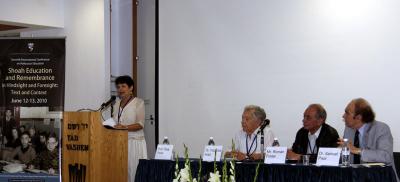13 June 2010
Some 200 decision makers in the field of education, from approximately 40 countries - including Austria, Australia, Canada, Croatia, France, Germany, Great Britain, Ireland, Italy, Japan, Mexico, Poland, Spain, and the United States - participated in a unique educational conference held at Yad Vashem. The 7th International Conference on Holocaust Education and Remembrance, held by the International School for Holocaust Studies at Yad Vashem, took place on Saturday night June 12 and Sunday, June 13, 2010. Participants weredecision makers and opinion shapers in their respective countries, including philosophers, historians, human rights activists, educators, politicians, ambassadors, and directors of various government ministries.
During the course of the Conference numerous questions were addressed, including: How should international organizations grapple with Holocaust denial? How should they respond to those who wish to diminish the Holocaust? Should visiting Holocaust-related sites be compulsory for high school students? Should educational authorities co-fund these trips? How do we teach about different historical contexts without a competition between the suffering of victims of different totalitarian regimes? How do we avoid falling into the pattern of always referring to the Jewish people as victims? By marking a few Holocaust memorial days over the course of the year, are we highlighting or diminishing its meaning?
Among the speakers at the conference were Israeli Minister of Education Gideon Sa’ar, Prof. Alain Finkielkraut, Chief Rabbi Israel Meir Lau, Dr. Yitzchak Arad, Dr. Samuel Pisar, Prof. Yehuda Bauer, Dr. Leonidas Donskis (Member of the European Parliament), Aleksander Kwasniewski, (former President of Poland), Stjepan Mesić (former President of Croatia), and Prof. Dina Porat.
At the conclusion of the discussions, recommendations were presented to the representatives of the Task Force for International Cooperation on Holocaust Education, Remembrance and Research (ITF) at its plenary meetings taking place in Jerusalem from June 14-17. Many of the conference’s participants will also take part in the ITF plenary. The ITF is currently chaired by Israel, and meetings of the ITF will take place in Israel during 2010. The ITF was established in order to raise awareness and education about the Holocaust through international cooperation. There are presently 27 member states in the ITF, and 7 countries are in various stages of candidacy for acceptance into the organization.
The conference is supported by the Adelson Family Foundation, the Asper Foundation and in collaboration with the Israel Ministry of Education and the Ministry of Foreign Affairs.







